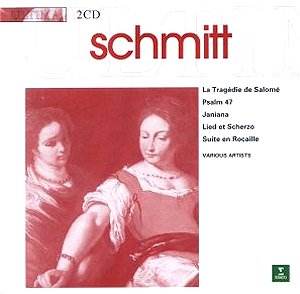Florent Schmitt was born in Blamont (Meurthe-et-Moselle),
France. His longevity meant that he was still alive when his Second
Symphony was premiered by Munch in 1958.
The first of the two CDs contains the works (Salomé
and Psalm) by which he is likely to be best known - if at all.
They were splendidly recorded by EMI-Pathé-Marconi in the early
1970s using ORTF forces conducted by Martinon. I still have that
luxurious sturdy gatefold LP as well as the more pinched CD incarnation.
The Tragédie is based not on Wilde but on a poem by Robert
d'Humières and is dedicated to Stravinsky then (1907) still a
‘wild boy’ both fêted and flogged by the Parisian cultural establishment.
There are reflections, as well as predictive touches, of Dukas (La
Péri), Wagner, Bax (Spring Fire, Fand and the
Second Symphony), Respighi (Vetrate di Chiesa), Holst (in The
Planets - try tr2 2.47) and Debussy (La Mer). The reduced
orchestra version was given in Paris on 9 November 1907 six months after
Strauss's Salome had been aired there. The large orchestra version,
given here, is heady, mood-rich, warmly dreamy. The distant vocalisation
of the choir at tr2 7.29 is very well handled - lovingly distanced.
The oriental Muezzin curving of the singing prompts thoughts of Delius's
Hassan and the Delius Requiem and also put me in mind
of two much later hyper-romantic works - Harty's Children of Lir
and Enescu's Vox Maris. Janowski does not have quite the
abandon incited by Jean Martinon but this is still a well conceived
and enthusiastic performance.
Schmitt pulls out all the stops for the single movement
Psalm. This shouts in colossal exultation with impassioned oaken
tones from the massed French radio choirs blazingly done and with a
nod towards the towering tones of Berlioz's choral monuments. It sounds
big - none of the chamber choir approach. While it is weakened to a
degree by a proneness to rum-ti-tum rhythms in the outer sections, recalling
his friend Vaughan Williams, it is also decidedly Rimskian and leans
on the example of Borodin and the Polovtsian Dances. Although
in one movement, it is a triptych (likened in the excellent notes to
Franck's Prélude, Chorale et Fugue) with the Glory
to the Lord and God has ascended framing He has chosen
the beauty of Jacob.
The solo violinists are Prat in Salomé and
Commentale in the Psalm. Commentale is given more to do and his
touchingly febrile role in the central panel is nicely balanced up with
his co-singer, the toweringly dramatic and operatic-toned Sharon Sweet.
I can easily hear her tackling Herrmann's jeu d'esprit pastiche
aria from Salammbo in Citizen Kane. The two soloists would
pair just as well in Frank Martin's Maria Triptychon. Such a
pity that while Erato have printed the words in English translation
the French is missing.
In Janiana the music melts suavely through the
nostalgic, the regretful and courtly panache - always tonal and always
engaging. There are several times when the music seems to be a likely
jumping off point for Bernard Herrmann's tragically romantic and elusive
moods. The dynamism of the writing, helped along by slightly acidic
sound from the mid-1960s, is reserved for the last of the four movements.
This is very affecting music. And if you are wondering about the title,
this derives from the first name of the dedicatee, Jane Evrard. Its
luxuriance is in the themes and emotions but not in the harmony and
counterpoint. The note-writer proposes some linkage with Psalm 47. However
the work is more lithe and its exultation is sharper and more cleanly
limned. It was written, during the Occupation, in the Pyrenees during
the spring of 1942.
The archaic-impressionism of the Suite is romantic
and subtly balanced. In a hundred details I would count this superior
to the recent Praga Digital version though the Czech musicians are better
recorded. Jamet and her players have a soft and secure hold on the butterfly
wings of this gem-like queue of miniatures. It was written for the Pierre
Jamet quartet and is in the tradition of the Ravel Introduction and
Allegro and the Bax Harp Quintet, Nonet and Elegiac Trio.
In the vif Ravel's emotionally piercing emphasis is entwined
with a country dance that sounds positively Viennese - not Schmitt's
first dalliance with Germanic culture - witness his Caprice Viennoise
recorded on a Timpani collection of rare recordings by Wolff and
the Lamoureux.
The 10 minute long Lied et Scherzo is dedicated
to Dukas and is startling in its dissonance; not that it is extreme
for a work written in 1910. Del Vescovo and Hubeau seem fully at ease
with the idiom and handle the sincere and coaxing song with engaging
address. The Gallic tone of the horn verges on the tubby but when, as
in 3.48, Vescovo sings his long tune the mood is superbly sustained.
The intractable balance between the two instruments is well done. The
Scherzo is by no means as good a piece of music as the Lied.
Despite the DDD emblazoned the box this will not apply
to the recordings on the second CD which date from the 1960s. These
must be ADD while CD1 (Psalm and Salomé) is almost
certainly a true DDD item.
This is an inexpensive set though one you do not often
see in the shops. . The anonymous notes are specially written and though
not lengthy tell you all you need to know. As with the other Ultimas
the design is clean and admirable. Pity Warners could not find more
Schmitt to flesh out the playing time. They clearly had plundered Erato's
tape archive pretty much to the back of the shelf.
Do not hesitate if you are at all interested in this
composer or his era. It is not unusual to see these Ultima sets on offer
with three at a very discounted price.
Rob Barnett


